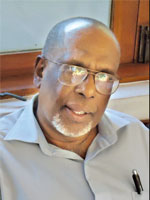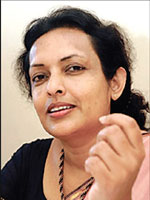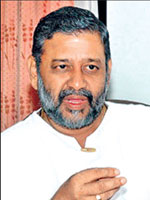|

Her body, her decision?
Nipuni WIMALAPALA
ome women are in a state of doubt on the subject of morality and
their rights as abortion has become one of the most controversial issues
of our times. Religious and Pro-life groups work hard to keep the new
life safe while Pro-choice organizations try to project their views. In
the meantime authorities want to reform laws or create new legislation
in a bid to safeguard both mother and the unborn.
The topic here is often considered a twofold controversy, but it is
actually a multifaceted issue that involves questions about biology,
morality, and legal rights. Those pro-life views argue that abortion
destroys human life, which they believe begins at conception. Therefore,
abortion is immoral and should be illegal. Some pro-life advocates allow
exceptions in the case of rape, incest, or when the mother’s health is
at risk.
  However the abortion debate is one of the most argued ones which
basically looks like an irresolvable conflict of rights: the right of
women to have fullest decision making power with regard to their own
bodies and the right of an unborn embryo to be born. Can one support
women’s rights and oppose abortion, is the main argument. However the abortion debate is one of the most argued ones which
basically looks like an irresolvable conflict of rights: the right of
women to have fullest decision making power with regard to their own
bodies and the right of an unborn embryo to be born. Can one support
women’s rights and oppose abortion, is the main argument.
Child Development and Women’s Affairs Minister Tissa Karaliyedda
spoke to Daily News Gender Forum emphasizing the importance of reducing
burden on women by reforming the prevailing laws regarding abortion
under strict conditions.
Commenting on the issue Subanghi herath, senior lecturer in
Sociology, University of Colombo and Professor Kalinga Tudor De Silva of
the Sociology Department of Peradeniya University expressed their views.
Minister highlighted the fact that women are being violated
continuously and rape and incest cases are rapidly increasing. The
authorities do their best to stop abuse against women and the proposed
legal reformations are a part of this endeavour.
“Our basic focus is girls under 18 years. They are the most
vulnerable group. Once a girl is pregnant due to rape or incest, that
unfortunate incident marks the end of her life. She has to carry the
pregnancy and give birth to the baby which is very unfair. Hence we want
to stop putting them into trouble because of horrific men. The next
factor is, when there are severe genetic abnormalities of the embryo. In
these two cases, abortion should be allowed. The proposed law reforms
will allow abortion when a girl under 18 is raped or incest and when
there are genetic abnormalities of the embryo” he stressed.
“This is not an open permission to abort unborn. But we want to safe
guard our young girls. The issue should be analyzed in women’s
perspective since they only go through the post tension and trauma of a
rape case. It is an inexpressible life time burden, pain and a shame for
a woman. And secondly, we do not need to give birth to genetically
abnormal babies knowingly, since definitely both baby and the parents
suffer throughout the life”, he further emphasized.
Dr. Herath began the discussion convincing that personally she is
against killing unborn babies, because a child is a precious and
priceless gift. “ Hence being humane, we should welcome all the unborn
infants to the world.” But her argument is a child should be welcomed by
its parents, family and the society. Then only he/she will receive love,
care, protection and recognition. If child is an unwanted one, he/she
won’t receive any of the most needed things throughout the life.
 |
 |
 |
It is a
women’s issue, a severe health issue, religious and
a moral issue. Unwanted pregnancy is a symptom of
a chain of problems
Professor Kalinga Tudor De Silva
Senior lecturer in Sociology
University of Peradeniya |
Woman is a
woman
no matter who she is, where she comes from, what her
education level is
or which religious group she
represents.
Dr. SUBANGHI HERATH
Senior lecturer in Sociology
University of Colombo |
Once a girl
gets pregnant due to rape or incest, that
unfortunate incident marks the end of her life. She has to
carry the pregnancy
and give birth to the baby
Tissa Karaliyedda
Child Development and Women’s Affairs Minister |
Minister’s view too supports this argument. He convinced that if
babies are born they must be properly cared and given all the desired
necessities. He highlighted that there are thousands of children left
behind in child care centres or probation centres without being properly
cared. In some of the places, children get abused and the owners of
these centres do earn money through these helpless orphans. Therefore he
tries to reduce the number of child care centers in the country and to
monitor the remaining ones properly.
Though we like it or not, abortion is common in Sri Lanka. Obviously
a large number of abortions are done everyday. Regardless of ethical and
religious norms women go for abortions when there is no other option.
Women do choose abortion due to many reasons.
According to Dr. Herath, a woman is a woman no matter who she is,
where she comes from, what her education level is or which religious
group she represents.
When a woman has an unwanted pregnancy, she goes through a lot of
mental hardships regardless of her age, race, status or religion. Women
have to suffer alone since biologically female body is constructed to
bear the pregnancy. But actually what happens is, both a man and a woman
engage in a sexual relationship which both of them enjoy. Then why women
have to go for abortions in certain occasions? We have to think very
differently and in a humane manner.
The first question is “Do women have full decision making power
regarding a sexual relationship?” Obviously the answer is no. Then how
many sexual relationships occur without the full consent of woman?
Obviously there are a lot. They cannot be categorized as rape. Without
full consent, but still not rape. It could happen by excessive
persuading, convincing, motivation, threatening or even by forced
consent. Sometimes it happens by giving a lot of hopes, based on trust.
So there are sexual relationships, not within consent but within trust.
Actually it is really hard to define it.
It is a humane issue. And there are some other cases, just human
mistakes. Unexpected sexual attraction without safe contraceptive method
could result in having an unwanted pregnancy. Both man and woman are
helpless and it is a dilemma.
Commenting on the issue, Prof. Silva emphasized that this is a multi
faced matter. It is a women’s issue, a severe health issue, religious
and a moral issue. Unwanted pregnancy is a symptom of a chain of
problems. However women should be given the right to decide on their own
body. This must happen under strict conditions. In women’s perspective
it is a stigma which reflects lack of female power and failure of
contraceptive methods. Allowing abortion is not the exact solution. But
it is the final option. So promoting effective contraceptive methods,
educating youth are fine solutions and even married couples would do a
lot to reduce unwanted pregnancies.
However the worst case is rape. Mostly women who are subjected to
rape condemn bearing the pregnancy. They do not want to keep the
pregnancy which resulted from a bitter sexual experience where her body
was used forcibly by an unwanted man whom she hates forever. She does
not enjoy the moment and never enjoy giving birth to his baby.
According to both Dr. Herath and Prof. Silva, in a rape case, there
is no argument that woman must be given the fullest decision making
power regarding her body. She should be allowed to decide whether she
needs to keep the pregnancy or abort. Her rights are already violated.
It is quite unfair to force her to raise the baby through which she will
suffer from continuous frustration, disgust and pain both physically and
psychologically.
Now the question comes, why the authorities allow abortion when only
a girl under 18 is raped or incest? Can women above 18 go through those
sufferings due to a rape? They are also women and no matter how old.
Prof. Silva convinced that there can be professional decisions made
by a legal committee. But do not forget that this is basically a humane
issue and have to look at the dimension of women’s rights.
The Minister said that they are concerned about it. He mentioned that
mostly the young girls under 18 are quite are vulnerable to rape and
especially to incest. So they pay attention to them first and hope to
deal with the other cases later. According to the Minister, a committee
has been formed by the Child Development and Women’s affairs Ministry,
Courts Ministry together with Health Ministry. The committee presents
law reforms and everything will be done through this committee. There
are two specialist doctors who do the medical tests and the final
decision is made by the Courts. Everything has to be done within three
to six months.
Dr. Herath accepts that it should be done within three months and the
procedure must be clear. However both Dr. Herath and Prof. Silva have
doubts about the practical situation. Basically it would be difficult to
make a decision within three months and also people would try to lodge
false complaints. Prof. Silva said that the committee should consist of
particular women’s organizations as well, because this is not merely a
professional issue. Women have to be given priority. Delays of law
enforcement system could not be occurred and efficiency and accuracy
must be there. Emotional conditions of real victims have to be taken
into account.
Minister Karaliyedda emphasized that the committee is quite concerned
over these issues and will work perfectly tackle side effects, religious
and public views. However they would make the best decision since it
will benefit women. Most of the developed countries allow abortion under
conditions and it has benefitted women and to secure their status.
Legalizing abortion is a matter of taking the already happening
abortions under control within credible and acceptable conditions. It is
a must to remember that abortion is not the best choice but the last
choice. If there is a least possibility to raise the baby, a woman
should do it.
Pregnancies due to the sexual relationships for pleasure are highly
unacceptable and both men and women have to avoid them. Social attitudes
regarding fatherless pregnancies have to be changed since the society
itself violates women again and again who are already in trouble.
Everybody has to have better attitudes and try to support women in
trouble without motivating them to commit suicide through continuous
tease and rejection.
Royal Navy’s first woman warship commander
The first female commander of a major Royal Navy warship has taken up
her post in Scotland.
Sarah West, 40, from Middlesex, has joined Type 23 frigate HMS
Portland in Rosyth, Fife.
Cdr West, who grew up in Lincolnshire and entered the Royal Navy in
1995, has previously commanded four minesweepers.
The warship is undergoing a refit and, on completion, it will undergo
trials before returning to its base in Devonport.
It will then be prepared for its next operational tasking.
Cdr West said: “Taking command of HMS Portland is definitely the
highlight of my 16 years in the Royal Navy so far.
“It is a challenge that I am fully trained for and ready to
undertake.
“I am very proud to be taking command of a Type 23 frigate, which is
an extremely flexible warship, and I’m looking forward to taking HMS
Portland on operations with a professional and focused team.”
In another milestone for the Royal Navy, Cdr Sue Moore, 43, recently
became the first woman to command a squadron of minor war vessels, the
First Patrol Boat Squadron (1PBS), based in Portsmouth.
Key appointments
Cdr Moore, from Bath, and Cdr West have a combined 36 years of
experience in the Royal Navy.
Their achievements include deployments ranging from the Gulf to the
Balkans to counter-narcotics patrols in the Caribbean. The pair have
been described as being part of a “cohort of talented female officers”
who joined the Royal Navy to serve at sea and are now undertaking or
approaching key appointments in their naval careers.
The Ministry of Defence (MoD) said that since women went to sea with
the Navy in 1990, they have achieved success in many fields and have
become pilots, observers and mine clearance divers. Last December, it
was announced that women will join their male counterparts in submarines
from 2013. Cdr Moore was one of the first two female officers to command
a Royal Navy warship, HMS Dasher, in 1998.
She has 14 P2000 Archer Class training vessels under her command, two
of which will be part of the honour guard during the forthcoming Queen’s
Diamond Jubilee Pageant.
In addition to Cdr West commanding HMS Portland, the MoD said it
expects three minor war vessels will be commanded by women by the end of
this year.
BBC
|



